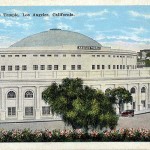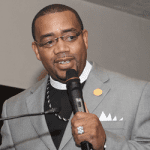I have not attended a Society for Pentecostal Studies (SPS) meeting in 4 years.I resigned from the society before I became president in 2009. This society is where I first met many of my colleagues, whom I sure wonder from time to time—“just what kind of Pentecostal are you?” That’s fine; I like to keep people guessing. I will not reiterate why I left that society but it seems that the long game some traditionalists have to use the society to ferret out the theologically suspect and the critically inquisitive is still in play. SPS is also where I met colleagues and developed relationships with people who I would, metaphorically, take a bullet for—people who make the academic game worth playing because from time to time, I get to play with my friends.
In what is the saving grace of the lamentable Godfather III, Michael Corleone, in an old man red cardigan sweater walks around his kitchen and whines, “every time I try to get out they pull me back in.” (You’ll have to trust me that this is the ONLY thing worth remembering about the movie). This is how I feel every spring since I left the SPS. Not that anyone is trying to pull me back in, but like Michael, I feel compelled to enter the fray, to stay in the game, since, to quote the far superior and classic Godfather II, “This is the business we’ve chosen.” So, from my perch far away from the SPS, let me offer a bit of historical context to why this endless search for pristine faith is not only searching for a Golden Age that never existed, but specifically the desire to “preserve and reserve,” simply fails to understand why alternative historiographical and theological trajectories are required to offer a bit of self-reflection.
Both within the SPS and now outside of it, from a group called the Institute for Religion and Democracy, comes a continued attempt to paint the moves the SPS has made over the last few years as unorthodox. Presumably, the SPS, and its leadership who espouse particular ideas about race and sexuality, are now under some orthodoxy radar? The link is here, /http://juicyecumenism.com/2013/04/08/race-sex-and-liberation-pentecostal-studies-president-steets-soceity-in-new-direction/ you can read it for yourself, but within the critique, which the IRD is completely free to make, are some historical assumptions that should be called into question. First, the idea that American Pentecostalism has ever spoken with one monolithic voice about issues regarding race are wrong, even sexuality, specifically being more accepting of LGBTQ peoples, is a fight that has been waged within Pentecostalism for decades—it has just become more visible since the trends towards full acceptance for LGBTQ peoples seems like a given and the reactionary apocalyptic rhetoric from some quarters reeks of shrill desperation.
Pentecostalism, the tradition of the President, Paul Alexander, is the Pentecostalism advocated by the early voices of his denomination, the Assemblies of God, who warned of God’s judgment on America if people offered their loyalties to any nation—and that people who fought in wars were exhibiting disloyalty to God and devotion to the idolatry of nationalism. The racial egalitarianism exhibited by William Seymour, leader of the Azusa Street Revival, demarcates the ideal that American Pentecostalism strived for in its early years, before the political, cultural and yes, theological realities of race made breaking the back of Jim Crow something few outside the black Pentecostal church sought as theological and political project. Alexander’s rhetoric of being “raced” is a way to displace himself and, by extension, all privileged white male Pentecostals from their perch as “preservers and reservers.” One does not have to look back too far in American Pentecostal history to see that those who have determined how to best preserve the vestiges of orthodoxy from the perceived deluge of disbelief have been white men, who, have also reserved for themselves that role in perpetuity, wrapping it in a palatable bricolage of theological and pietistic certitude. What Alexander has figured out, (he’s been talking about this for a long time), is that this is about power, this is about who has the right to open and close that epistemic circle that determines “biblical and historic Christian faith,” which, if one looks at say, the first 20 years of Pentecostalism, (never mind the rest of Christianity, or we’d be here all day), changed. What was sanctification? Was it superseded by Spirit Baptism? Did sanctification and Spirit Baptism accomplish the same thing? Who got to determine that? What is the Trinity? What about those Oneness Pentecostals who have lived quite harmoniously with Trinitarian Pentecostals for years in the SPS?
Over dinner at a job talk once at an evangelical college, I was asked about that, the person asked me what the SPS, what Trinitarian Pentecostals were going to do about the Oneness people in their midst? He asked me personally if I had made any attempts to right the theological wrongs of my dear friend—(needless to say I knew I was not getting that job, so I ordered another Cab), I responded no, that he was my friend, he was one of the few Latinos I had ever seen at the SPS, and that his friendship, and the ethnic and historic solidarity I shared with him was more important to me than correcting him, because why is that my job? The person looked dumbfounded, as if NOT-correcting was worse than being NON-Trinitarian. I consider my non-Trinitarian friend one of those friends who’d I take a bullet for, as I would for Paul Alexander, whose prophetic leadership of SPS may have come to an end, but whose steering away the SPS from the cultural and theological hegemony of traditionalists, towards openness will hopefully outlast his leadership. Pentecostalism’s long road to ruin, traditionalists would have you believe, begins with critical intellectual inquiry. What they don’t understand is that the road to ruin is strewn with the depleted hopes and dreams of exasperated exiles like me who can no longer stand by and be complicit in the purge of critical thinkers from Pentecostalism’s ranks.
I am one of those Pentecostals whose liberation comes from not preserving, but from breaking the theological, cultural, and political strangleholds of power held onto so tenaciously by the dominant culture. I am one of those Pentecostals who wish to reserve for ourselves this most unusual of gatekeeping tasks—we don’t need people telling us what to think and how to work out our faith, the fear and trembling come at us with the same capacity to create joy or endure doubt.
Just this one time, I wish I’d been dragged back into the SPS brawl– one last time.















